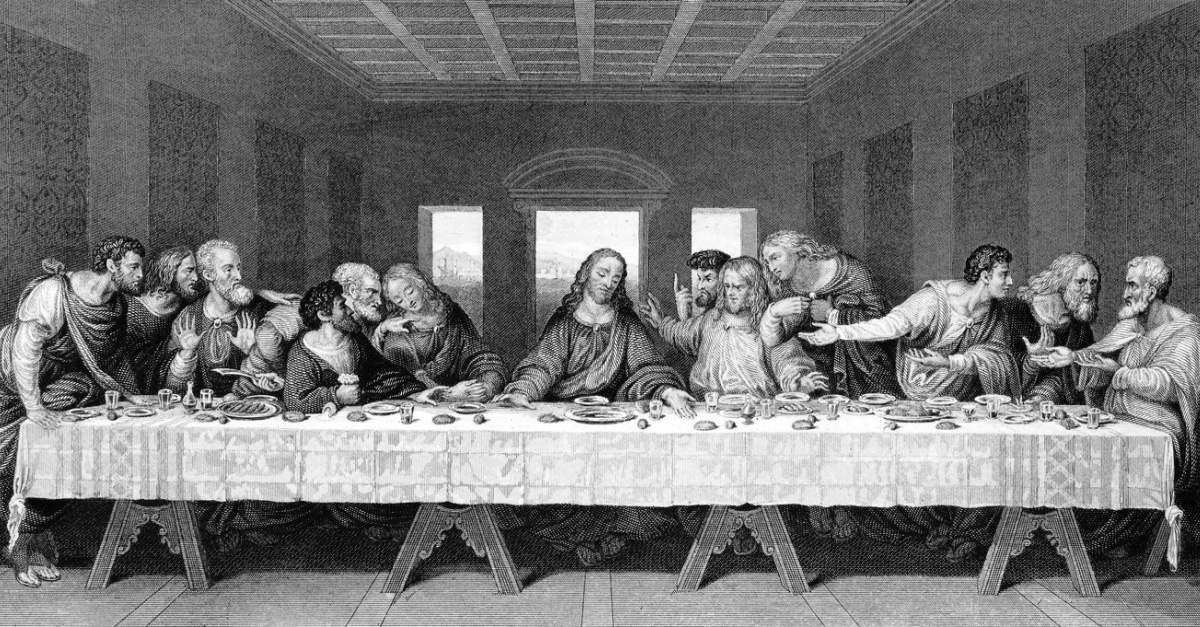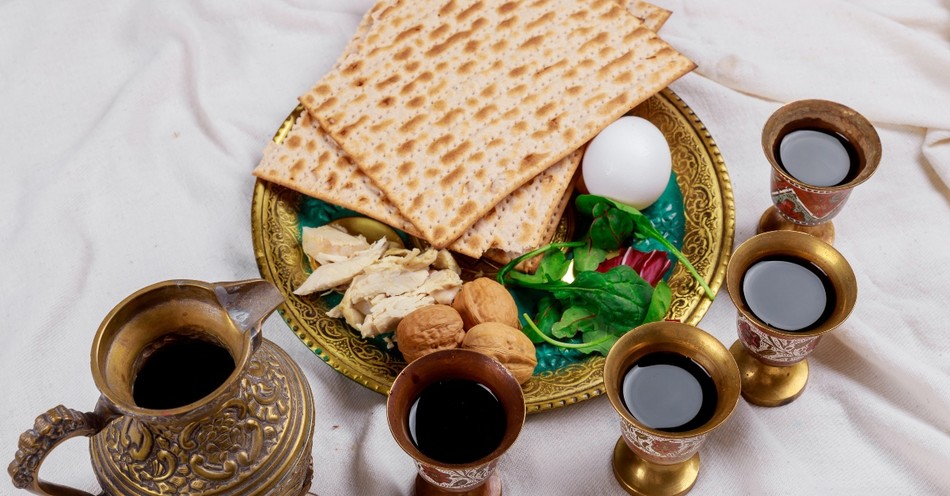Read Bible verses about the tradition of Passover in the Old and New Testaments. Learn how Jesus Christ was the fulfillment of the lamb sacrificed for Passover as Christians now partake in the communion of His body and blood.
What Is Passover in the Bible?
Passover in the Bible originates from the book of Exodus when God instructed Moses and Aaron and the Israelite people in Egypt to mark their houses with the blood of a lamb so that the Lord would "pass over" their house and spare their firstborn son. The biblical text is found in Exodus 12:
The Passover and Festival of Unleavened Bread
The LORD said to Moses and Aaron in the land of Egypt, "This month shall be for you the beginning of months. It shall be the first month of the year for you. Tell all the congregation of Israel that on the tenth day of this month every man shall take a lamb according to their fathers' houses, a lamb for a household. And if the household is too small for a lamb, then he and his nearest neighbor shall take according to the number of persons; according to what each can eat you shall make your count for the lamb. Your lamb shall be without blemish, a male a year old. You may take it from the sheep or from the goats, and you shall keep it until the fourteenth day of this month, when the whole assembly of the congregation of Israel shall kill their lambs at twilight.
"Then they shall take some of the blood and put it on the two doorposts and the lintel of the houses in which they eat it. They shall eat the flesh that night, roasted on the fire; with unleavened bread and bitter herbs they shall eat it. Do not eat any of it raw or boiled in water, but roasted, its head with its legs and its inner parts. And you shall let none of it remain until the morning; anything that remains until the morning you shall burn. In this manner you shall eat it: with your belt fastened, your sandals on your feet, and your staff in your hand. And you shall eat it in haste. It is the LORD's Passover. For I will pass through the land of Egypt that night, and I will strike all the firstborn in the land of Egypt, both man and beast; and on all the gods of Egypt I will execute judgments: I am the LORD. The blood shall be a sign for you, on the houses where you are. And when I see the blood, I will pass over you, and no plague will befall you to destroy you, when I strike the land of Egypt. "This day shall be for you a memorial day, and you shall keep it as a feast to the LORD; throughout your generations, as a statute forever, you shall keep it as a feast. Seven days you shall eat unleavened bread. On the first day you shall remove leaven out of your houses, for if anyone eats what is leavened, from the first day until the seventh day, that person shall be cut off from Israel.
On the first day you shall hold a holy assembly, and on the seventh day a holy assembly. No work shall be done on those days. But what everyone needs to eat, that alone may be prepared by you. And you shall observe the Feast of Unleavened Bread, for on this very day I brought your hosts out of the land of Egypt. Therefore you shall observe this day, throughout your generations, as a statute forever. In the first month, from the fourteenth day of the month at evening, you shall eat unleavened bread until the twenty-first day of the month at evening. For seven days no leaven is to be found in your houses. If anyone eats what is leavened, that person will be cut off from the congregation of Israel, whether he is a sojourner or a native of the land. You shall eat nothing leavened; in all your dwelling places you shall eat unleavened bread."
Then Moses called all the elders of Israel and said to them, "Go and select lambs for yourselves according to your clans, and kill the Passover lamb. Take a bunch of hyssop and dip it in the blood that is in the basin, and touch the lintel and the two doorposts with the blood that is in the basin. None of you shall go out of the door of his house until the morning. For the LORD will pass through to strike the Egyptians, and when he sees the blood on the lintel and on the two doorposts, the LORD will pass over the door and will not allow the destroyer to enter your houses to strike you. You shall observe this rite as a statute for you and for your sons forever. And when you come to the land that the LORD will give you, as he has promised, you shall keep this service. And when your children say to you, 'What do you mean by this service?' you shall say, 'It is the sacrifice of the LORD's Passover, for he passed over the houses of the people of Israel in Egypt, when he struck the Egyptians but spared our houses.'" And the people bowed their heads and worshiped. Then the people of Israel went and did so; as the LORD had commanded Moses and Aaron, so they did. (Exodus 12:1-28)
God's instructions about the Passover appear again, with details about how to observe it once the Israelites had left Egypt, in other parts of the Torah (the first five books of the Bible). These include references in Numbers 9:1-4, Numbers 28:16-25, Deuteronomy 16:1-6, and Leviticus 23:4-8. These other references show that God did not intend the Passover as a one-time event, but an annual feast where the Israelites would remember how God had saved them.
How Was Passover Observed?
“These are the appointed feasts of the Lord, the holy convocations, which you shall proclaim at the time appointed for them. In the first month, on the fourteenth day of the month at twilight, is the Lord's Passover. And on the fifteenth day of the same month is the Feast of Unleavened Bread to the Lord; for seven days you shall eat unleavened bread. On the first day you shall have a holy convocation; you shall not do any ordinary work. But you shall present a food offering to the Lord for seven days. On the seventh day is a holy convocation; you shall not do any ordinary work.” (Leviticus 23:4-8)
The Feast of the Unleavened Bread begins with the Passover meal on the evening of 15 Nisan (on the Jewish calendar) and lasts seven days. Together, these feasts commemorate Israel's liberation from slavery in Egypt. The word Passover refers to the angel of death "passing over" Hebrew homes when killing the firstborn of the Egyptians, for the Jews had put lamb's blood on their doorposts. Unleavened bread is a reminder of the haste with which the Hebrews left Egypt. This Passover was fulfilled in Christ, whose blood was shed to free humanity from bondage to sin and death.
The Last Supper: Passover with the Disciples

Photo Credit: ©Getty Images/Andrew Howe
Jesus came at least twice to Jerusalem to observe Passover. He came at the start of his ministry when he cleared the temple and declared that if the temple was destroyed, he would rebuild it in three days (John 2:13-22). When Jesus came the next time, riding into Jerusalem on a donkey, he and his disciples got a private room for observing Passover.
"And on the first day of Unleavened Bread, when they sacrificed the Passover lamb, his disciples said to him, "Where will you have us go and prepare for you to eat the Passover?" And he sent two of his disciples and said to them, "Go into the city, and a man carrying a jar of water will meet you. Follow him, and wherever he enters, say to the master of the house, 'The Teacher says, Where is my guest room, where I may eat the Passover with my disciples?' And he will show you a large upper room furnished and ready; there prepare for us." And the disciples set out and went to the city and found it just as he had told them, and they prepared the Passover.
And when it was evening, he came with the twelve. And as they were reclining at table and eating, Jesus said, "Truly, I say to you, one of you will betray me, one who is eating with me." They began to be sorrowful and to say to him one after another, "Is it I?" He said to them, "It is one of the twelve, one who is dipping bread into the dish with me. For the Son of Man goes as it is written of him, but woe to that man by whom the Son of Man is betrayed! It would have been better for that man if he had not been born." (Mark 14:12-21)
Recommended
Relation Between Easter and Passover
Passover (or Pascha) sanctified Israel's time and life as a sign pointing them to the coming Incarnation of the Lord, Jesus Christ. In this feast, they were to remember Him and what He did for them in delivering them from Egyptian bondage. But more importantly, it pointed them to His coming in the flesh. When John the Baptist saw Jesus, he told his followers, "Behold, the Lamb of God, who takes away the sin of the world!" (John 1:29). The Israelites were to know Him in the blood of a slain lamb, a sign pointing to Him as the Lamb of God. Yet when He became incarnate as this Lamb, they did not recognize their own Lord who had delivered them from Egypt (John 1:11).
When Jesus and his disciples had the Passover meal in Jerusalem, he took the wine and bread (items that were supposed to be eaten at particular times with particular words spoken over them for the Passover proceedings). Instead of speaking from Exodus 12 or talking about the Israelites slaying a lamb in Egypt, he did something different:
"Now as they were eating, Jesus took bread, and after blessing it, broke it and gave it to the disciples, and said, “Take, eat; this is my body.” And he took a cup, and when he had given thanks he gave it to them, saying, “Drink of it, all of you, for this is my blood of the covenant, which is poured out for many for the forgiveness of sins." (Matthew 26:26-28)
By saying these words, Jesus claimed something about himself that shifted how his followers saw Passover: he claimed to be the Passover lamb. This theme continues in the later books of the New Testament, particularly the epistles.
"Cleanse out the old leaven that you may be a new lump, as you really are unleavened. For Christ, our Passover lamb, has been sacrificed." (1 Corinthians 5:7)
"Let us, therefore, celebrate the festival, not with the old leaven, the leaven of malice and evil, but with the unleavened bread of sincerity and truth." (1 Corinthians 5:8)
"For you know that it was not with perishable things such as silver or gold that you were redeemed from the empty way of life handed down to you from your ancestors, 19 but with the precious blood of Christ, a lamb without blemish or defect." (1 Peter 1:18-19)
"They triumphed over him by the blood of the Lamb and by the word of their testimony; they did not love their lives so much as to shrink from death." (Revelation 12:11)
Read more about the Last Supper Bible story and its meaning.
Commentaries about Passover and Easter
Many Bible scholars have noted how God's instructions in Exodus 12 for the Passover lamb foreshadow Jesus' coming when the Lamb of God died for the sins of the world. Here are some notable insights:
"Your lamb shall be without blemish. Without any spot or defect in it. Maimonides reckons no less than fifty blemishes in a creature, any one of which makes it unfit for sacrifice, see (Leviticus 21:21-24) . This lamb was a type of Christ, who is therefore said to be our Passover sacrificed for us, (1 Corinthians 5:7) comparable to a lamb for his innocence and harmlessness, for his meekness, humility, and patience, for usefulness both for food and raiment, as well as for being fit for sacrifice; and who is a lamb without spot and blemish, either of original sin, or actual transgression, holy in his nature, harmless in his life."
(Excerpted from John Gill's Exposition on the Whole Bible, on Exodus 12:5)
"The paschal lamb was typical. Christ is our Passover, 1 Cor 5:7. (1.) It was to be a lamb; and Christ is the Lamb of God (John 1:29), often in the Revelation called the Lamb, meek and innocent as a lamb, dumb before the shearers, before the butchers. (2.) It was to be a male of the first year (v. 5), in its prime; Christ offered up himself in the midst of his days, not in infancy with the babes of Bethlehem. It denotes the strength and sufficiency of the Lord Jesus, on whom our help was laid. (3.) It was to be without blemish (v. 5), denoting the purity of the Lord Jesus, a Lamb without spot, 1 Peter 1:19. The judge that condemned him (as if his trial were only like the scrutiny that was made concerning the sacrifices, whether they were without blemish or no) pronounced him innocent. (4.) It was to be set apart four days before (v. 3, v. 6), denoting the designation of the Lord Jesus to be a Saviour, both in the purpose and in the promise. It is very observable that as Christ was crucified at the Passover, so he solemnly entered into Jerusalem four days before, the very day that the paschal lamb was set apart. (5.) It was to be slain, and roasted with fire (v. 6-9), denoting the exquisite sufferings of the Lord Jesus, even unto death, the death of the cross."
(Excerpted from Matthew Henry's Commentary on the Whole Bible, Exodus 12)
Further Reading:
What Is Pascha, and Is it Part of Easter?
What Was the Symbolism of the Last Supper? Its Meaning and Significance
Cover Photo credit: ©GettyImages/photovs
Christianity.com's editorial staff is a team of writers with a background in the Christian faith and writing experience. We work to create relevant, inspiring content for our audience and update timely articles as necessary.









